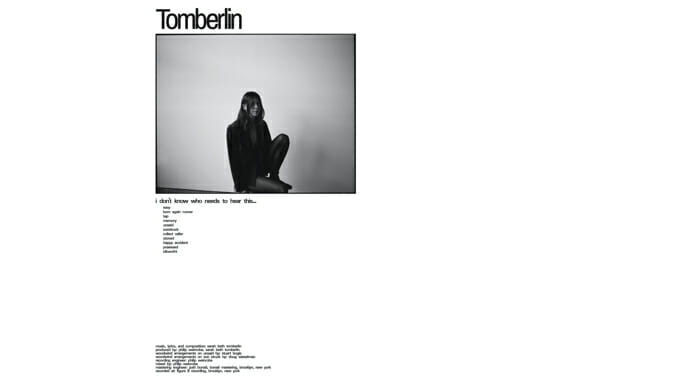On i don’t know who needs to hear this…, Tomberlin Offers Solace to the Void
The indie-folk artist’s new album finds her elevating her sound while sacrificing none of its power

In recent years, there’s been an influx of musicians embracing minimalism. Often, the lack of excess can lead to these songs being dismissively tagged as “sad,” particularly if the artist dares to fill that space with any emotion at all. One of the finest practitioners of this sparse musicality is Sarah Beth Tomberlin, who performs under her surname. Her 2018 debut album At Weddings drew comparisons to ambient icons like Grouper and staples of contemporary indie like Julien Baker. Her music sits at the intersection of these artists’ in both sound and subject. At Weddings dealt with Tomberlin’s internal conflict, having left her home and religion behind. Raised in rural Illinois as a pastor’s kid, she uprooted to Louisville, where the bulk of At Weddings came to fruition. Since then, she’s moved to New York and released an EP called Projections in 2020. Projections, produced with Alex G, saw Tomberlin’s arrangements fill out—several of its tracks played with percussion, something rarely found on her debut. The natural next step was for her to follow in the footsteps of Baker, who began making hollow, devastating music before gradually fleshing out her band. And she did, sort of. Her new album, i don’t know who needs to hear this… is grander than anything she’s done before, but rarely does it feel like a departure. Recorded in Brooklyn with producer Philip Weinrobe, known for his work with Adrienne Lenker and Buck Meek, the record features contributions from Shahzad Islamly and Told Slant’s Felix Walworth. Where At Weddings was written without a goal in mind and carries that homespun air, the deliberateness of the songs on idkwntht is palpable. At the record’s heart is Tomberlin simultaneously embracing self-love and acceptance (“born again runner”), and taking love away from toxic influences (“collect caller”), no matter how difficult both acts may be. Results aren’t the point; it is simply the act of trying and holding space for one’s emotions that counts.
The record opens with “easy,” a plodding and expansive song that nearly reaches the six-minute mark. It’s a bold choice as an opener, because its structure is quite challenging. Built atop a dreary, unpolished drum beat, the song repeatedly teases a grand, sweeping build, only for it to be undercut just as consistently. It’s unique, structured much more like hills and valleys on the horizon than a mountain in front of you. The peaks may not be that high, but the range goes on past where you can see. Tomberlin’s writing and performance are also strange, with each line seeming to pile on top of the next, as though she’s reciting a poem, rather than relaying her unvarnished thoughts.
The most powerful aspect of “easy” is the space around Tomberlin. As it drones on, flares of aberrant, crystalline piano swirl within the void. Without these, it’s a song that would quickly become frustrating. While sparsity is Tomberlin’s calling card, “easy” is downright austere. A few tracks later, we hear another song closely related to the arrangement of “easy,” this one called “tap.” Where “easy” reads more like poetry, “tap” feels raw, like a genuine stream of consciousness. Once again centered on a simple percussive pattern, “tap” is the sound of Tomberlin having an internal crisis, desperately trying to make sense of the world and how she fits into it—“I’m not a tree / I’m in a forest of buildings / I’m not a singer / I’m just someone who’s guilty.”
One of the most quietly compelling moments on the record follows “tap,” another song of crisis called “memory.” While the relationship she’s singing about is not one of a religious nature, she still filters trust as an idea through a spiritual framing—“Trusted in the invisible when I was young / Practiced 20 years left me undone / But I’ve tasted and I’ve seen you / And still trust won’t come.” As it interrogates the blindness inherent in faith, the song hits something central to the wonder of Tomberlin’s music. Lines here about how we hold on to physical aspects of memory are deeply moving—”kept your voicemail in my pocket / Afraid one day it’d stop playing / And I’d never hear your voice again.” As she sings about listening to this voicemail over and over like a song on repeat, I couldn’t think of anything besides the several emails and text messages I still have from my late grandmother, and how profound it feels to still have them, physical pieces of memory that still feel ephemeral inside a phone screen. It’s a concept she articulates in a way that slams into you, despite its subtlety.
-

-

-

-

-

-

-

-

-

-

-

-

-

-

-

-

-

-

-

-

-

-

-

-

-

-

-

-

-

-

-

-

-

-

-

-

-

-

-

-








































